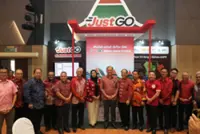JAKARTA: The Downstream Oil and Gas Regulatory Agency (BPH Migas) is slated to reduce the amount of solar subsidised diesel fuel motorists can buy per day to ensure its equal distribution.
BPH Migas head Erika Retnowati said the agency would revise rules stipulating the maximum purchase limit in Presidential Regulation (Perpres) No. 191/2014 on the provision, distribution and retail pricing of fuel.





